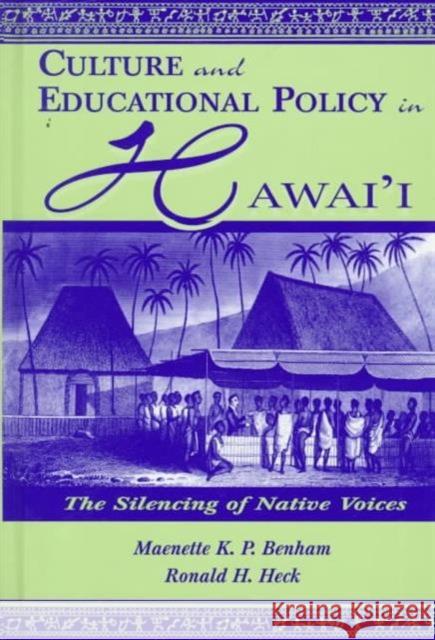Culture and Educational Policy in Hawai'i : The Silencing of Native Voices » książka
Culture and Educational Policy in Hawai'i : The Silencing of Native Voices
ISBN-13: 9780805827033 / Angielski / Twarda / 1998 / 280 str.
Culture and Educational Policy in Hawai'i : The Silencing of Native Voices
ISBN-13: 9780805827033 / Angielski / Twarda / 1998 / 280 str.
(netto: 669,47 VAT: 5%)
Najniższa cena z 30 dni: 654,86
ok. 22 dni roboczych
Dostawa w 2026 r.
Darmowa dostawa!
An assessment of Native Hawaiian education, this text focuses on the historical, political and cultural contexts which produced the system's institutionalized structure, which results in marginalization in schools and wider society. This is placed in the context of American minority cultures.
This comprehensive educational history of public schools in Hawai'i shows and analyzes how dominant cultural and educational policy have affected the education experiences of Native Hawaiians. Drawing on institutional theory as a scholarly lens, the authors focus on four historical cases representing over 150 years of contact with the West. They carefully link historical events, significant people, educational policy, and law to cultural and social consequences for Native Hawaiian children and youth.
The authors argue that since the early 1800s, educational policy in Hawai'i emphasizing efficiency has resulted in institutional structures that have degenerated Hawaiian culture, self-image, and sovereignty. Native Hawaiians have often been denied equal access to quality schools and resulting increased economic and social status. These policies were often overtly, or covertly, racist and reflected wider cultural views prevalent across the United States regarding the assimilation of groups into the American mainstream culture.
The case of education in Hawai'i is used to initiate a broader discussion of similar historical trends in assimilating children of different backgrounds into the American system of education. The scholarly analysis presented in this book draws out historical, political, cultural, and organizational implications that can be employed to understand other Native and non-Native contexts. Given the increasing cultural diversity of the United States and the perceived failure of the American educational system in light of these changes, this book provides an exceptionally appropriate starting point to begin a discussion about past, present, and future schooling for our nation's children. Because it is written and comes from a Native perspective, the value of the "insider" view is illuminated. This underlying reminder of the Native eye is woven throughout the book in Ha'awina No'ono'o--the sharing of thoughts from the Native Hawaiian author.
With its primary focus on the education of native groups, this book is an extraordinary and useful work for scholars, thoughtful practitioners, policymakers, and those interested in Hawai'i, Hawaiian education, and educational policy and theory.











